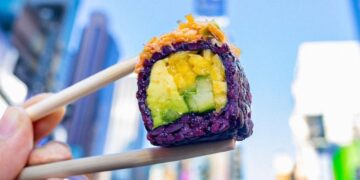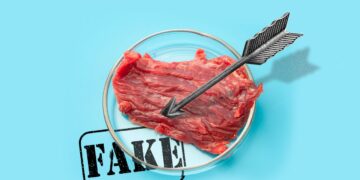[ad_1]
With the abundance of bottles alongside cabinets in liquor shops and filtering into classes on digital ordering providers, it’s a marvel how anybody settles upon a wine to deliver house. Maybe shoppers returns to a beloved varietal or trusted area, perhaps it’s the artwork on a label or a last-second whim that seals the deal. With Souleil Vin De Bonté, the attract is a mix of all the above. Created by two childhood associates initially from the south of France, Marianne Fabre-Lanvin and Thomas Delaude, each of whom are wine specialists, Souleil Vin De Bonté started as a ardour mission and remodeled into three contemporary, finessed wines good for a day apero, romantic picnic or banquet. Crafted utilizing organically grown grapes from an unbiased producer alongside the Mediterranean, Souleil‘s wines—Le Rouge, Le Rosé and Le Blanc—all retail for under $20. It makes the refreshing blends much more interesting.

“I’ve all the time needed to create my very own wine,” Fabre-Lanvin, who’s now primarily based in Paris, tells us. “A short while again, Thomas and I had been chatting and he stated that he needed to craft a brand new wine as a private mission. I stated, ‘How about we do it collectively?’ I used to be ready for this chance.” From the luscious liquid to the playful design and a non-profit dedication, the duo started to place Souleil’s items collectively.
“After we began conceptualizing Souleil, along with producing natural wines we’d love, we needed to position the atmosphere on the forefront,” Delaude says. “As a kitesurfer, I’m significantly obsessed with defending our oceans. I needed to clarify the significance of manufacturing natural wine, and spotlight the hyperlink between natural wine and ocean conservation, which is why Souleil is sponsoring non-profits for seashore cleanups and academic packages.” This lent the model a function past pleasure.

As for the manufacturing course of, Fabre-Lanvin jokingly aligns it with witchcraft. “We’re not within the winery,” she says, “however we fastidiously supply and choose the juices after which we do the mix, which relies on our private style. We needed to create a wine that has this easygoing really feel, a wine you recognize goes to attraction to everybody on the desk, whether or not you’re a wine connoisseur or not.”

All three wines have a Mediterranean taste profile. “We knew we needed to incorporate a big proportion of Piquepoul—a favourite varietal, and a match made in heaven with oysters—within the Le Blanc,” Fabre-Lanvin says. “Le Rosé is generally Grenache Noir, as a result of we consider that it is among the greatest grapes to make use of for rosé wines: it’s juicy and we love its ripe, pink fruit flavors. For Le Rouge, we needed one thing contemporary and versatile that you would barely chill and both serve by itself—because of its supple tannins, good acidity and fruit flavors—or pour with a meal.”

The label design instantly coincides with the liquid inside. “We love the nice and cozy shade palette,” Fabre-Lanvin says. “We mentioned the mission and considered oceans and sunsets. We needed the design to be French in a approach. We had been drawn to photographs of early twentieth century eau de cologne labels, and the ’60s and ’70s French Mediterranean vibe present in iconic movies and style editorials from these a long time.”

To translate these wisps of inspiration into bottles, the companions tapped their pal Anna Polonsky, founding father of branding company Polonsky & Friends. “When my lead graphic designer Claire Dufournier and I began to talk with Marianne and Thomas, they spoke extensively about how they needed their wine to replicate the heat and retro attraction of the South of France whereas additionally trying towards the longer term,” Polonsky says.

“In consequence, we shared a few inventive instructions with them, and so they selected the one impressed by ’20s to ’70s eau de cologne labels and aperitif posters,” she continues. “These had been true graphic masterpieces, typically combining monochromes, naive imagery and particular layouts and framing methods with elegant and timeless typography work. The workforce needed these graphic qualities to transpire in our wine labels for a really feel that may be subtly classic, graphic and unapologetically French.”

To do that, “Claire created coastal, maritime illustrations with old skool French crayons, every of them that includes a solar in several settings, as a homage to the model’s title which implies solar within the Occitan dialect,” Polonsky continues. “The illustrations had been paired with a gorgeous font evoking the ’60s to ’70s South of France really feel. The summary iconography, mixed with the round body, sans serif fonts and the poppy monochromes deliver a recent contact to the classic inspiration.”

For the non-profit companion, Fabre-Lanvin and Delaude seemed to a different pal, Carolina Sevilla, co-founder of 5 Minute Foundation, an initiative that organizes seashore cleanup classes and encourages schooling globally. With proceeds from Soleil, they’ve been “organizing concurrently with cleanups in France with one other group—inserting stations for our program Pals of the Ocean or educating college students at private and non-private faculties in Costa Rica by means of our program Ocean Heroes,” Sevilla says. Maybe unsurprisingly, Soleil intends to supply their wine to volunteers on the basis’s gatherings, starting with cleanups in Mauritius (the place Fabre-Lanvin’s sister lives).

By way of their private community, Soleil has achieved distribution within the US, Ibiza, Australia and different places. Fabre-Lanvin has a imaginative and prescient for the longer term, too. “Souleil is a technique to entertain in addition to do one thing good for and with our associates and wider circles. We wish to be current wherever our prolonged circle is, and actually our ambition is to have enjoyable.”

Delaude provides, “In a number of years, I hope to have the ability to share Souleil with extra associates by the seaside and have our workforce and people in our circle take part in beach-cleaning occasions that result in plastic upcycling, arrange by non-profit companions around the globe.” It’s a worthy, social ambition from a model that goals to be accessible.
Within the US, Souleil is now available to order by means of Convive Wines.
Photographs by David Fritz Goeppinger and Doris Poe
[ad_2]
Source link







